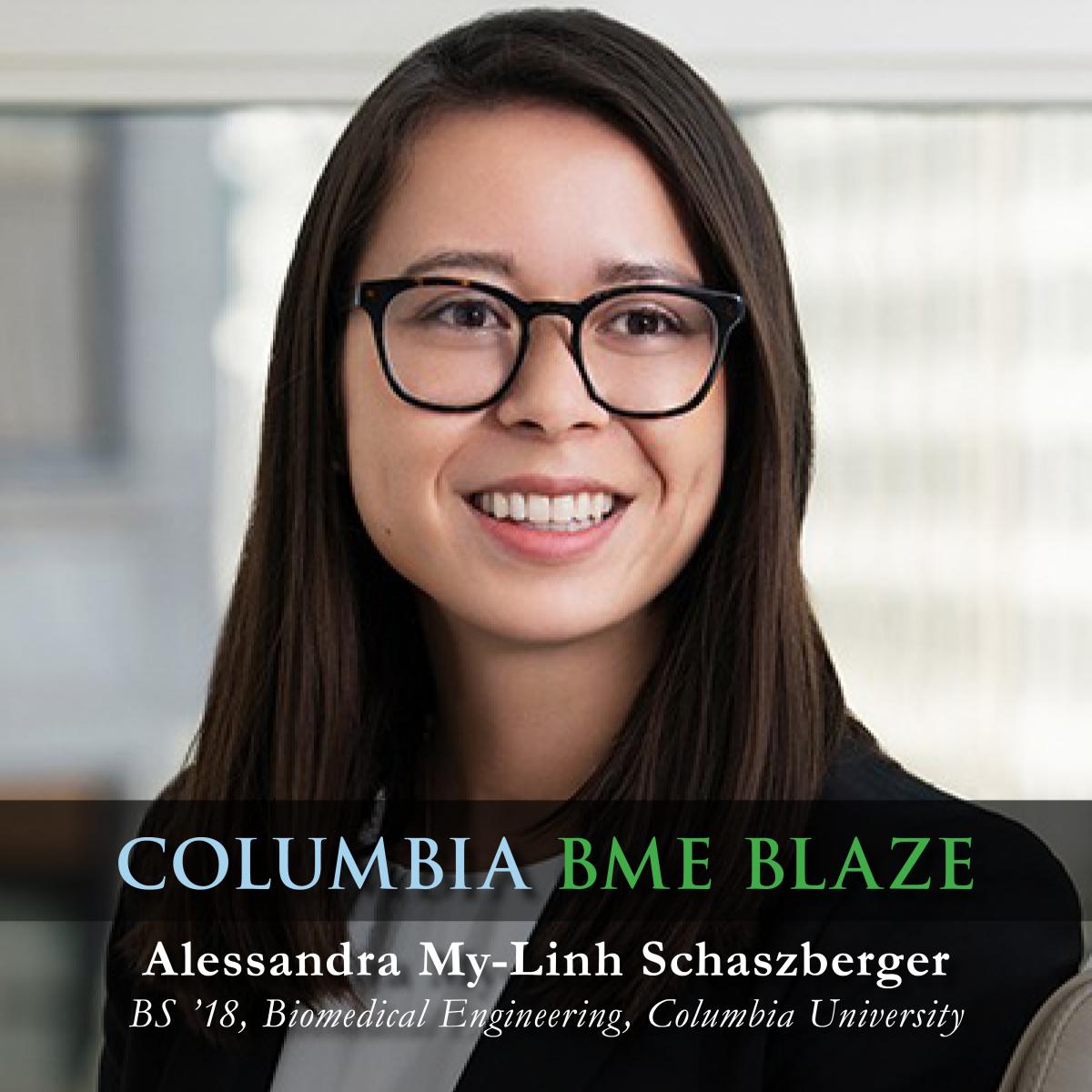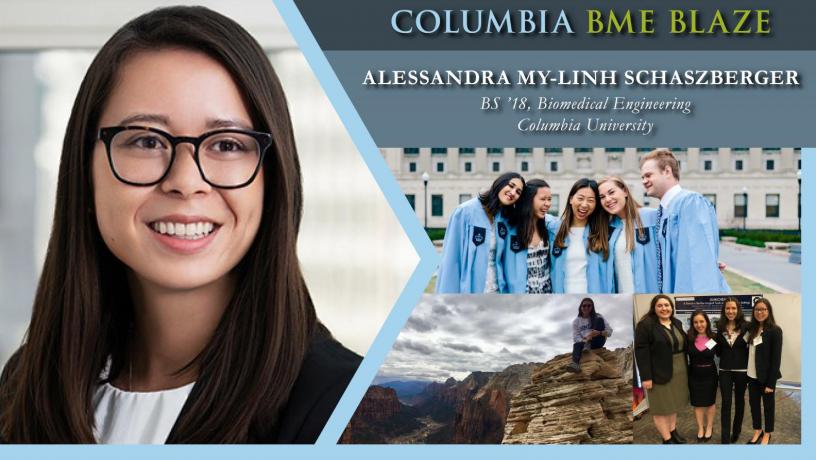January 2022 - BME Blaze: Alessandra My-Linh Schaszberger
In this monthly spotlight, get to know the alumni, students, and scientists of Columbia's Department of Biomedical Engineering. Read what our BME folks are up to, from our labs' latest research, to our students' plans for the future, to our teams' innovations, start-ups and other career successes.
We had fun catching up with Columbia BME alumna (BS '18) Alessandra My-Linh Schaszberger as she told us about her experience as a BME undergrad and about her current role at global law firm Latham & Watkins, LLP. Read below to get to know Alessandra!

Alessandra My-Linh Schaszberger
- B.S., Biomedical Engineering, 2018, Columbia University
- J.D., 2021, Georgetown University Law Center
Where are you from?
I was born in Washington, D.C. and grew up in Bethesda, MD.
What is your current role?
I am currently a law clerk* at Latham & Watkins, LLP.
* Not admitted to practice in any jurisdiction. All work supervised by a member of the DC Bar.
What were some of your favorite projects/memories from the Columbia BME program?
There are so many to choose from, but the Senior Design Project was one of my favorite memories. My team’s project was called Lumichem, and we developed a device that could cheaply sterilize surgical tools in developing countries and rural areas where electricity and water remains unreliable. The project allowed me to synthesize everything that I had learned over the previous three years at Columbia. Beyond the engineering aspect of the project, I enjoyed exploring some of the business and operational challenges that would come with commercializing the device in a real-world setting, like talking to the Tech Transfer Office about the patentability of our project (these discussions also sparked my interest in becoming a lawyer). When I was studying, I sometimes forgot the bigger picture of how engineering fits into a larger business or mission. The project allowed me to roll up my sleeves and get my hands dirty to solve an important problem that affects billions of people.
I also enjoyed spending long hours in the lab with my amazing team members (shout out to Stephanie Michaels, Hana Navarro, Rhiana Rivas, and Vivian Xiao). So much of BME involves collaboration, and it was invaluable to see how people approached problems differently, and how each of us brought our own skills to the table. My Senior Design experience would not have been the same without Professor Aaron Kyle’s wealth of knowledge and eagerness to help. He is an invaluable mentor and one of the department’s greatest assets.
How has your experience with Columbia BME contributed towards your goals?
Columbia BME taught me how to solve problems and think critically, two skills that have been extremely important in my law career. I’ve found many parallels with law and engineering. For example, in engineering, you create a hypothesis then test it out in an experiment, while in the law, you start with your theory or argument, and then conduct legal research to support your argument. They’re also both very goal oriented – in engineering, you’re trying to create a solution to a specific problem, and in law, you’re trying to help your client achieve a particular result. I also learned how to be a team player, which is essential to my current work in a law firm. Each case is staffed by a team of lawyers and we each have our own roles and responsibilities.
For Columbia BME students interested in pursuing a career in Intellectual Property/Patent law, your engineering degree can be extremely valuable. It allows you to speak intelligently with clients and better understand the technology behind their inventions. Also, most students with an engineering degree are eligible to take the patent bar (most law students are not eligible to take this exam). The exam allows you to prosecute (i.e., draft) patents and help inventors obtain legal protection for their ideas. This is just one example of how an engineering degree can open many doors.
Any words of wisdom or tips for BME students?
Keep an open mind and remind yourself that it’s okay to go against the grain. Many of my classmates, for example, ended up pursuing careers in medicine. Being the only BME student (to my knowledge) to apply to law school made me doubt myself and my decisions, but I knew in my gut that this was the career I was passionate about pursuing.
Share your experiences in the program. It might open people’s eyes to new opportunities that they may not have known about otherwise, and vice versa. It could give others the courage to pursue an opportunity because they know that someone who was in their shoes has gone through a similar experience.
Don’t be afraid to seek out and receive feedback. I sometimes had the mentality that I needed to be perfect. But I was wrong – my biggest growth experiences always came from failing and then learning from those failures.
And finally, don’t forget: BME students can change the world. While none of us would like to repeat the experience of the pandemic, it undoubtedly highlighted the many contributions of biomedical engineering to public health. Whether it is rapid diagnostic testing equipment, ventilators, respirators, wearable medical technology, or other breakthroughs, biomedical engineers have been at the cutting edge of combatting this disease. BME is a field that is constantly evolving, innovating, and saving lives. What’s not to love?
What are you excited about?
I just started my legal career and am excited to see where it takes me. I am eager to make an impact on the intellectual property field, but right now I still have so much to learn. I hope to learn from the other lawyers at my firm and find good mentors who can help me as I progress in my career.
COLUMBIA BME ACADEMICS
BME students can change the world. While none of us would like to repeat the experience of the pandemic, it undoubtedly highlighted the many contributions of biomedical engineering to public health. Whether it is rapid diagnostic testing equipment, ventilators, respirators, wearable medical technology, or other breakthroughs, biomedical engineers have been at the cutting edge of combatting this disease. BME is a field that is constantly evolving, innovating, and saving lives. What’s not to love?

Images (clockwise):
1. Columbia University graduation photo
2. My senior design group presenting at Rice University
3. A picture of me at the top of Angel’s Landing
